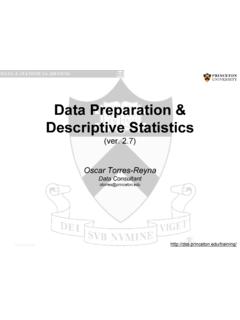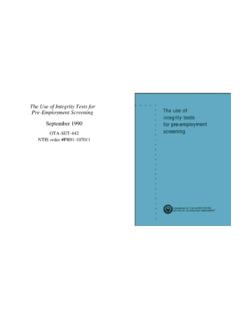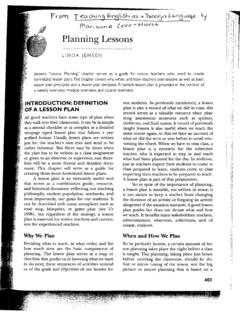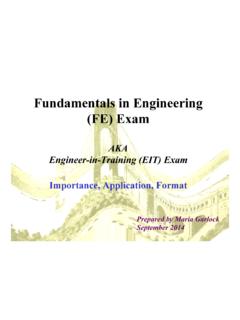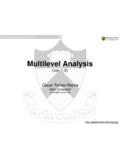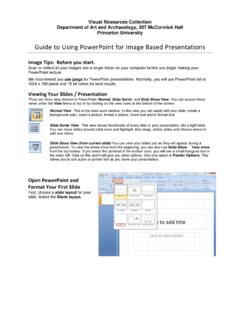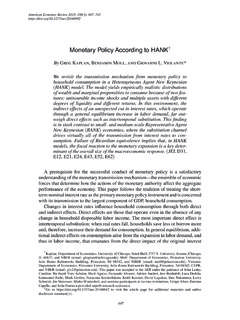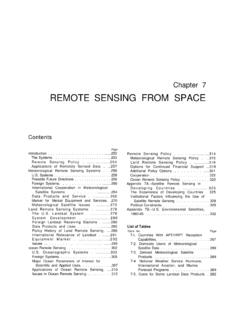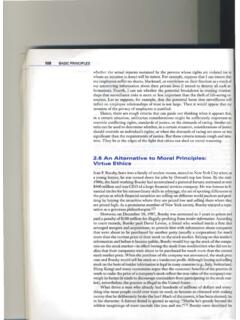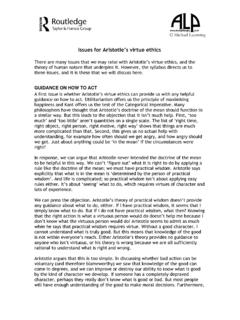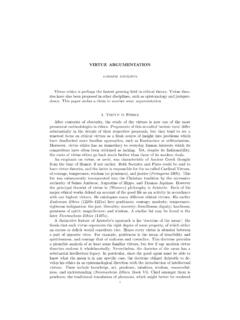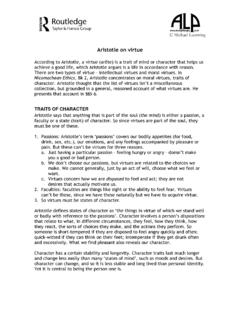Transcription of Rosalind Hursthouse, On Virtue Ethics - Princeton University
1 RosalindHursthouse, : Oxford UniversityPress, 1999. Pp. x, by Gilbert Harman, Department of Philosophy, Princeton Univer-sityVirtue Ethics is atype of ethic al theory in which the notion of Virtue or goodcharacter plays a central role. This splendid new book describes a program for the development of a particular ( Aristotelian ) form of Virtue Ethics . Thebook is intended to be used as a textbook, but should be read by anyoneinterested in moral philosophy. hursthouse has been a major contributorto the development of Virtue Ethics and the program she describes, whilemaking use of the many contributions of others, is very much her program,with numerous new ideas and book has three parts. The first dispels common misunderstandingsand explains how Virtue Ethics applies to complex moral issues. The sec-ond discusses moral motivation, especially the motivation involved in doingsomething because it is right.
2 The third explains how questions about theobjectivity of Ethics are to be approached within Virtue s Virtue Ethics takes as central the conception of a human be-ing who possesses all ethical virtues of character and no vices or defects ofcharacter human being rather than person because the relevant char-acter traits are natural to the a first approximation, Virtue Ethics says that a right action is an actionamong those available that a perfectly virtuous human being would charac-teristically do under the circumstances. This is only a first approximationbecause of complications required in order accurately to describe certainmoral is possible to be faced with a dilemma through having acted wrongly. Inone of hursthouse s examples, a man, promising marriage, gets two womenpregnant. Given that there is no way to fulfill all of his promises, what isthe right thing for him to do?
3 Distinguish two senses in which acourseof action might be right an action-guiding sense and an action-assessmentsense. Something will be wrong with whatever the promiser does, so there isno way for him to do what is all right, or right in the action-assessment there may be a best or right choice for him to make in the circumstances,a choice that would be right in the action-guiding is right in the action-guiding sense cannot always be identified as thechoice that a perfectly virtuous human being would make in the circum-stances, because sometimes a completely virtuous human being could neverbe in the relevant circumstances. hursthouse believes that Virtue Ethics isstill applicable, because she thinks that Virtue Ethics provides rules that canapply to such a case. However, although I see how Virtue Ethics can pro-vide rules, it remains unclear to me how the rules provided could handle thisparticular situation.
4 She says that every Virtue of character yields a positiverule of action and every vice or defect of character yields a negative rule;so, Virtue Ethics allows for such rules as that one ought to tell the truth,one ought to keep ones promises, one ought to be kind to others and and2one should not act meanly, lie, or break promises. Where these simple rulesconflict, hursthouse proposes to fine tune them by considering what a vir-tuous human being would do in various circumstances. Perhaps this yieldsthe right rules for circumstances no virtuous human being could be in, but Ido not understand also notes that the promiser might use something that sounds like theterminology of Virtue and vice in reasoning what to do. Perhaps it wouldbe callous to abandonA, but not to abandonB. Perhaps it would be moreirresponsible to abandonAthan to abandonB.. Then marryingAwouldbe the morally right decision.
5 But in this instance the vices of callousnessand irresponsibility are characteristics of possible actions rather than char-acter traits of the agent. (No matter what the agent does, the agent willcontinue to have a bad character.) So, it remains unclear how these remarksfit together with the overall any event, hursthouse also observes that a completely virtuous humanbeing might find herself in adilemm ain which nothing th at she does isright in the action-assessment sense. An example might be the situation inSophie sChoicein which amother must chose which of her children is tobe killed immediately and which possibly saved; if she fails to chose, theyare both to be killed immediately. In such a case, there might be a decisionthat is right in the action-guiding sense a decision that a fully virtuousagent would make in that situation but the act cannot be a right act in theaction-assessment sense, since it will not be all first part ofOnVirtueEthicsis concerned with the basic structure of3this sort of Virtue Ethics , with considerable discussion of moral dilemmas orone or another sort.
6 Inevitably, hursthouse is unable to discuss every aspectof this structure. She explicitly sets aside issues of justice, for would have liked to see discussion of the worry that the Virtue ethicalcharacterization of right action is trivial because a fully virtuous humanbeing must have perfect practical rationality. ( Virtue is not just a matterof having the right ends, as in St. Paul s or John Lennon s idea that Allyou need is love, or Plato s idea that all you need is a properly orderedsoul. Practical rationality is needed also.) The worry is that there is nogood way to characterize perfect practical rationality so as to guarantee thatthe fully virtuous human being will do the right thing, on the one hand,while not, on the other hand, reducing the basic principle of Virtue Ethics tothe trivial claim that what is right is what would be done by someone whocharacteristically does what is right.
7 Again, it may be that Virtue Ethics isable to avoid this trivialization of principle, but I do not see is involved in doing somethingbecauseitisright? hursthouse answersthat it is to act in the way a fully virtuous human being acts for the reasonsthat the fully virtuous human being acts on. She shows in marvellous detailthat this answer agrees with common sense in a variety of answer also makes sense theoretically. A fully virtuous agent character-istically acts in a certain way precisely because the agent s character leadsthe agent to act in that way. But for the act to be right just is for the agent s4character to be such as lead the agent to do that act. So, it follows fromvirtue Ethics that the fully virtuous agent does the act because it is is not that the fully virtuous agent does the act because he or shethinksit is right. The agent may think, for example, She needs my help.
8 Onthe other hand, if someone else does a similar act motivated by the thoughtthat this is what the virtuous agent would do, the other human being doesit because she thinks the act is right and does not in the same way do theact directly because it is right. Doing something directly because it is theright thing to do is not the same as doing it because one thinks it is the rightthing to says that moral motivation of this sort is a matter of with little or no moral character gradually become adults with fullmoral character and capable of full moral motivation. Someone may be partlyvirtuous and partly not, in some ways virtuous and in some ways not. To theextent that an agent s act results from a character that is relevantly similarto that of a fully virtuous human being, we can allow that the agent doessomething because it is right. Huck Finn may act from more or less virtuouscharacter traits and so hide Jim from Jim s slave owner because it is rightto hide Jim, even though Huck thinks that it is wrong.
9 On the other hand, hursthouse says that a confirmed Nazi who does the right act on a particularoccasion does not do it because it is right, given the great distance betweenthe Nazi s character and the character of a virtuous human third, most difficult and richest part of the book discusses whether virtueethics has resources to determine objectively what the human virtues arise about this in part because different human beings in differ-ent cultures belonging to different traditions disagree about the virtues andabout the relative importance of those virtues they agree about. For exam-ple, there are differences between Europeans and East Asians concerning therelative importance of prudential virtues of individual development as com-pared with social virtues of community. There are also disagreements aboutthe virtues within a given society. Can we reasonably suppose that these aredisagreements about objective matters of fact?
10 Many believe that such disagreements are not objective. Some think it isa matter of local convention what the right virtues are. Others think thatone can choose what virtues to aspire to, where different human beings canbe equally justified in choosing different virtues . But hursthouse thinks itmay be possible to find an objective basis for a single set of human virtuesof character within a generally Aristotelian this approach, judgments of good and defective character are to be assessedin terms of the biological, social, and rational nature of human beings. Shebegins her discussion of this issue by considering simple cases judgmentsone might make about plants and animals. One might judge that a certaintree has good roots, that a particular tiger has a defective heart, that anothertiger is a fine specimen, or that there is something wrong with a wolf thatdoes not participate in the hunt with the other wolves.
